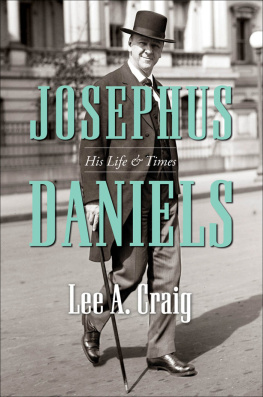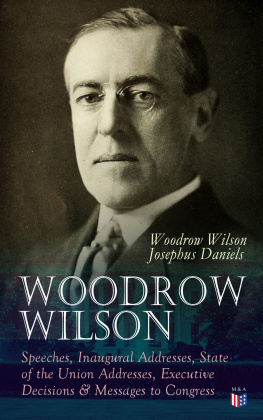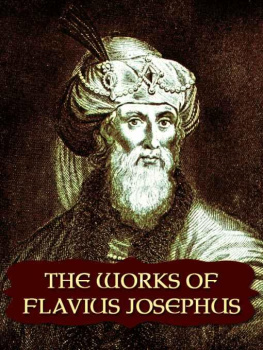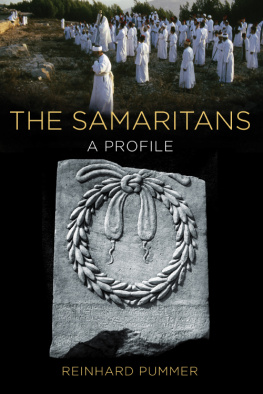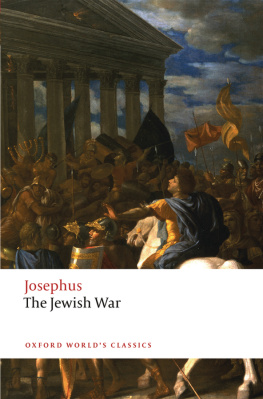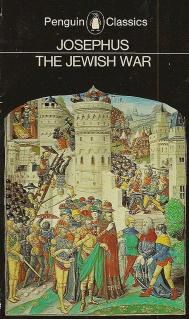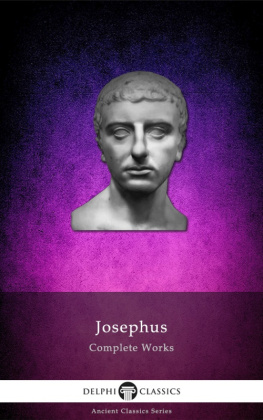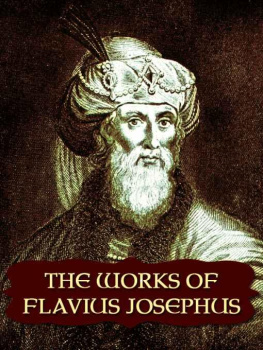This book was published with the assistance of the William R. Kenan Jr. Fund of the University of North Carolina Press.
2013 THE UNIVERSITY OF NORTH CAROLINA PRESS
All rights reserved. Designed by Sally Fry.
Set in Calluna by Tseng Information Systems, Inc.
Manufactured in the United States of America.
The paper in this book meets the guidelines for permanence and durability of the Committee on Production Guidelines for Book Longevity of the Council on Library Resources.
The University of North Carolina Press has been a member of the Green Press Initiative since 2003.
Library of Congress Cataloging-in-Publication Data
Craig, Lee A. (Lee Allan), 1960
Josephus Daniels : his life and times / by Lee A. Craig.
pages cm
Includes bibliographical references and index.
ISBN 978-1-4696-0695-8 (alk. paper)
1. Daniels, Josephus, 18621948. 2. Cabinet officersUnited StatesBiography. 3. AmbassadorsUnited StatesBiography. 4. United StatesDept. of the NavyBiography. 5. Press and politicsUnited StatesHistory. 6. United StatesPolitics and government19011953. 7. Publishers and publishingNorth CarolinaBiography. 8. Newspaper publishingNorth CarolinaHistory. I. Title.
E748.D19C73 2013
973.9092dc23
[B]
2012041235
17 16 15 14 13 5 4 3 2 1
Preface
For nearly thirty-five years, from the election campaign of 1898 until he became U.S. ambassador to Mexico in 1933, Josephus Daniels was the most powerful man in North Carolina. Governors came and went, but Daniels and his flagship newspaper, the Raleigh News and Observer (N&O), stayed. During President Woodrow Wilsons two terms in office (191321), Daniels served as secretary of the navy. No one ever held the position longer than he did. In that capacity, and as one of Wilsons closest confidants, Daniels was one of the most powerful men in the country. Once the United States entered World War I in 1917, Daniels became one of the most important men in the world.
Daniels earned his initial fame and made a fortune in the newspaper business. A self-made man, he owned his first newspaper at age eighteen. Before his twenty-first birthday, he owned three. Daniels revolutionized the newspaper business and, with other newspapermen of his generation, changed the relationship between politics and the news media. Before Daniels entered the business, except for the owners of the big-city papers, newspapermen could not survive financially on subscriptions and advertising alone. At the time, governments did not generally maintain their own printing shops; thus political patronage, in the form of government printing contracts, provided local newspapers with the margin between profit and loss. The price of that profit was effective control of the newspapers content. The holder of the government contracts became a wholly owned subsidiary of the majority wing of the majority party granting the contracts. Daniels recognized that an expansion of subscriptions would allow a local newspaper to be profitable without government contracts. Advertising would follow where subscriptions led. But a broad subscription base required newspapers to be sold for their news content, not their political opinions. As a teenage newspaper entrepreneur, Daniels surmised that if he could create a news organization that generated a sufficient circulation and advertising revenues, then the politicians would come to his newspaper with their hats in hand rather than the other way around. It took many years, but Daniels succeeded in this quest, creating a publishing dynasty that would last a century.
Daniels was among the handful of men who changed that situation, creating the modern newspaper, with international, national, and local news sections, including features, sports, comics, and editorials, all interspersed with advertisements and supplemented by classified ads.
A few of Danielss contemporaries, such as William Randolph Hearst and Joseph Pulitzer, could make a living selling independent newspapers in a small number of densely packed cities, but America was a nation of farms and small towns. Daniels figured out how to turn a profit in places like Wilson, Kinston, Rocky Mount, and Raleigh, North Carolina. In the late nineteenth and early twentieth centuries the U.S. economy grew, on average, a bit more than 3 percent a year. The circulation of Danielss newspapers grew five times as fast.
While Daniels was amassing his own fortune, he served as one of his generations most articulate and persistent critics of unregulated capitalism, never failing to call for government control, or outright ownership, of various private enterprisesincluding the eras greatest industry, the railroads. His newspapers pushed for the passage of the nations landmark antitrust laws and the hard-nosed prosecution of other capitalists. Daniels foresaw the concentration of great wealth in the hands of men like James Buchanan Duke, founder of the American Tobacco Company. Arguing that the Dukes of the world would not use their wealth for societys betterment, Daniels did not hesitate to call upon the coercive powers of the state to constrain such men.
Daniels leveraged his success as a businessman into political clout, and he leveraged his political clout into an unlikely position: head of the U.S. Navy. A devout Christian and a near-pacifist, Daniels created one of historys greatest war machines, which helped win World War I. Having won the war, the Allies then lost the peace. Daniels was one of the few men Wilson held in high regard and consulted throughout his eight years in the White House. He disagreed with Wilsons neutrality policies before the United States entered the war, and he questioned many of Wilsons prescriptions for the postwar world. Yet Daniels failed to steer Wilson from either course. The former led to the countrys entry into the war, and the latter led to the disaster that was the Versailles Treaty. World War II was a result of that failure.
A staunch anti-imperialist, as secretary of the navy, Daniels nonetheless oversaw an aggressive extension of U.S. military power, including the invasion or occupation of Nicaragua, Mexico, Haiti, the Dominican Republic, and Cuba. By default he became the receiver of several what today would be called failed states. By the time he stepped down as head of the navy, he personally oversaw a gunboat empire. However, having once ordered the invasion of Mexico, later in life, as U.S. ambassador to that country (193341), Daniels would help steer it and the United States toward a long-term peace that benefited both countries.
Daniels proved to be a good judge of political talent. He saw something in a staid Presbyterian professor named Woodrow Wilson that many party leaders missed. And before anyone else, Daniels imagined the great potential in a man others considered a pampered, arrogant Harvard twit, and he gave that man, Franklin Delano Roosevelt (FDR), his start on the worlds greatest political stage. Young FDRs career at the national level began as assistant secretary of the navy under Danielss tutelage. You have taught me so wisely, Roosevelt wrote to Daniels toward the end of their long service together at the Navy Department. As one of Roosevelts biographers notes, Daniels was the only man under whom Roosevelt ever served in any capacity. Henceforth, even after becoming president, FDR called Daniels Chief. Later in life, Roosevelt paid homage to Daniels as tutor par excellence in the political arts. FDR might well have gone on to great things without Danielss patronage, but he owed his start to Daniels.


